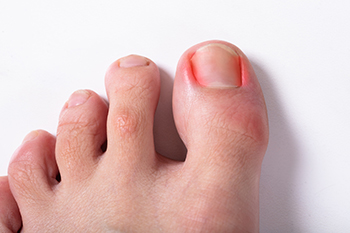
Young runners often face nail issues like inconsistent thickness or ingrown toenails due to repetitive pressure and friction from training. Running, especially over long distances, places stress on the toes as they repeatedly hit the front of the shoe. This pressure can cause nails to thicken unevenly, making them brittle or prone to splitting. Ingrown toenails, where the nail grows into the surrounding skin, often result from wearing tight or poorly fitted shoes or improper trimming techniques. These conditions can lead to pain, swelling, or infection, impacting performance and comfort. Maintaining consistent nail care, such as trimming straight across and ensuring proper shoe fit, helps prevent these problems. If you are a young runner experiencing persistent toenail pain or ingrown toenails, it is suggested that you schedule an appointment with a podiatrist for individualized treatment.
Ingrown toenails may initially present themselves as a minor discomfort, but they may progress into an infection in the skin without proper treatment. For more information about ingrown toenails, contact Jennifer Swan, DPM of Right Step Foot Care. Our doctor can provide the care you need to keep you pain-free and on your feet.
Ingrown Toenails
Ingrown toenails are caused when the corner or side of a toenail grows into the soft flesh surrounding it. They often result in redness, swelling, pain, and in some cases, infection. This condition typically affects the big toe and may recur if it is not treated properly.
Causes
- Improper toenail trimming
- Genetics
- Improper shoe fitting
- Injury from pedicures or nail picking
- Abnormal gait
- Poor hygiene
You are more likely to develop an ingrown toenail if you are obese, have diabetes, arthritis, or have any fungal infection in your nails. Additionally, people who have foot or toe deformities are at a higher risk of developing an ingrown toenail.
Symptoms
Some symptoms of ingrown toenails are redness, swelling, and pain. In rare cases, there may be a yellowish drainage coming from the nail.
Treatment
Ignoring an ingrown toenail can have serious complications. Infections of the nail border can progress to a deeper soft-tissue infection, which can then turn into a bone infection. You should always speak with your podiatrist if you suspect you have an ingrown toenail, especially if you have diabetes or poor circulation.
If you have any questions, please feel free to contact our office located in Westerville, OH . We offer the newest diagnostic and treatment technologies for all your foot care needs.
